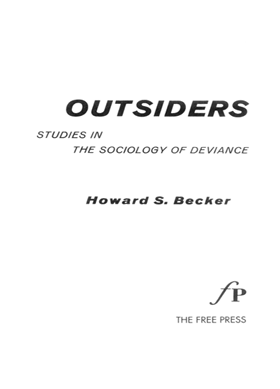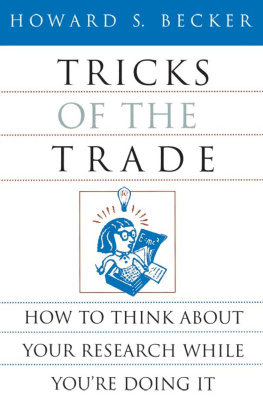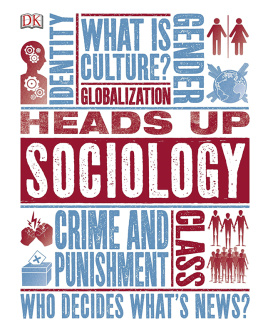Howard Saul Becker - Outsiders: studies in the sociology of deviance
Here you can read online Howard Saul Becker - Outsiders: studies in the sociology of deviance full text of the book (entire story) in english for free. Download pdf and epub, get meaning, cover and reviews about this ebook. year: 1966, publisher: Simon and Schuster, genre: Politics. Description of the work, (preface) as well as reviews are available. Best literature library LitArk.com created for fans of good reading and offers a wide selection of genres:
Romance novel
Science fiction
Adventure
Detective
Science
History
Home and family
Prose
Art
Politics
Computer
Non-fiction
Religion
Business
Children
Humor
Choose a favorite category and find really read worthwhile books. Enjoy immersion in the world of imagination, feel the emotions of the characters or learn something new for yourself, make an fascinating discovery.

- Book:Outsiders: studies in the sociology of deviance
- Author:
- Publisher:Simon and Schuster
- Genre:
- Year:1966
- Rating:3 / 5
- Favourites:Add to favourites
- Your mark:
- 60
- 1
- 2
- 3
- 4
- 5
Outsiders: studies in the sociology of deviance: summary, description and annotation
We offer to read an annotation, description, summary or preface (depends on what the author of the book "Outsiders: studies in the sociology of deviance" wrote himself). If you haven't found the necessary information about the book — write in the comments, we will try to find it.
Outsiders: studies in the sociology of deviance — read online for free the complete book (whole text) full work
Below is the text of the book, divided by pages. System saving the place of the last page read, allows you to conveniently read the book "Outsiders: studies in the sociology of deviance" online for free, without having to search again every time where you left off. Put a bookmark, and you can go to the page where you finished reading at any time.
Font size:
Interval:
Bookmark:

THE FREE PRESS
A Division of Simon & Schuster Inc.
1230 Avenue of the Americas
New York, NY 10020
www.SimonandSchuster.com
Copyright 1963 by The Free Press of Glencoe
Copyright renewed 1991 by Howard S. Becker
Chapter 10, Labelling Theory Reconsidered,
copyright 1973 by Howard S. Becker
First Free Press Paperback Edition 1966
All rights reserved, including the right of reproduction in whole or in part in any form.
THE FREE PRESS and colophon are trademarks of Simon & Schuster Inc.
ISBN 0-684-83635-1
ISBN-13: 978-0-684-83635-5
eISBN-13: 978-1-439-13636-2
Manufactured in the United States of America
10 9 8
William Faulkner, AS I LAY DYING
Sometimes I aint so sho whos got ere a right to say when a man is crazy and when he aint. Sometimes I think it aint none of us pure crazy and aint none of us pure sane until the balance of us talks him that-a-way. Its like it aint so much what a fellow does, but its the way the majority of folks is looking at him when he does it.
FOUR chapters of this book originally appeared in slightly different form elsewhere. Chapter 3 appeared in the American Journal of Sociology, LIX (November, 1953); Chapter 5 appeared in the same journal, LVII (September, 1951). Both are reprinted here with the permission of the Journal and the University of Chicago Press. Chapter 4 appeared in Human Organization, 12 (Spring, 1953), and is reprinted here with the permission of the Society for Applied Anthropology. Chapter 6 appeared in Social Problems, 3 (July, 1955), and is reprinted with the permission of the Society for the Study of Social Problems.
The material in Chapters 3 and 4 was originally prepared as a Masters thesis in Sociology at the University of Chicago, under the direction of Everett C. Hughes, W. Lloyd Warner, and Harvey L. Smith. Dan C. Lortie commented on an early draft of one of the papers.
I did the research on which Chapters 5 and 6 are based while I was a member of the staff of the Chicago Narcotics Survey, a project undertaken by the Chicago Area Projects, Inc., with the help of a grant from the National Institute of Mental Health. Harold Finestone, Eliot Freidson, Erving Goffman, Solomon Kobrin, Henry McKay, Anselm Strauss, and the late R. Richard Wohl criticized early versions of these papers.
I am greatly indebted to Blanche Geer, who read and discussed several versions of the entire manuscript with me. My thinking on questions of deviance, as on all matters sociological, owes much to my friend and teacher, Everett C. Hughes.
Dorothy Seelinger, Kathryn James, and Lois Stoops typed the several versions of the manuscript with patience and care.
ALL social groups make rules and attempt, at some times and under some circumstances, to enforce them. Social rules define situations and the kinds of behavior appropriate to them, specifying some actions as right and forbidding others as wrong. When a rule is enforced, the person who is supposed to have broken it may be seen as a special kind of person, one who cannot be trusted to live by the rules agreed on by the group. He is regarded as an outsider.
But the person who is thus labeled an outsider may have a different view of the matter. He may not accept the rule by which he is being judged and may not regard those who judge him as either competent or legitimately entitled to do so. Hence, a second meaning of the term emerges: the rule-breaker may feel his judges are outsiders.
In what follows, I will try to clarify the situation and process pointed to by this double-barrelled term: the situations of rule-breaking and rule-enforcement and the processes by which some people come to break rules and others to enforce them.
Some preliminary distinctions are in order. Rules may be of a great many kinds. They may be formally enacted into law, and in this case the police power of the state may be used in enforcing them. In other cases, they represent informal agreements, newly arrived at or encrusted with the sanction of age and tradition; rules of this kind are enforced by informal sanctions of various kinds.
Similarly, whether a rule has the force of law or tradition or is simply the result of consensus, it may be the task of some specialized body, such as the police or the committee on ethics of a professional association, to enforce it; enforcement, on the other hand, may be everyones job or, at least, the job of everyone in the group to which the rule is meant to apply.
Many rules are not enforced and are not, in any except the most formal sense, the kind of rules with which I am concerned. Blue laws, which remain on the statute books though they have not been enforced for a hundred years, are examples. (It is important to remember, however, that an unenforced law may be reactivated for various reasons and regain all its original force, as recently occurred with respect to the laws governing the opening of commercial establishments on Sunday in Missouri.) Informal rules may similarly die from lack of enforcement. I shall mainly be concerned with what we can call the actual operating rules of groups, those kept alive through attempts at enforcement.
Finally, just how far outside one is, in either of the senses I have mentioned, varies from case to case. We think of the person who commits a traffic violation or gets a little too drunk at a party as being, after all, not very different from the rest of us and treat his infraction tolerantly. We regard the thief as less like us and punish him severely. Crimes such as murder, rape, or treason lead us to view the violator as a true outsider.
In the same way, some rule-breakers do not think they have been unjustly judged. The traffic violator usually subscribes to the very rules he has broken. Alcoholics are often ambivalent, sometimes feeling that those who judge them do not understand them and at other times agreeing that compulsive drinking is a bad thing. At the extreme, some deviants (homosexuals and drug addicts are good examples) develop fullblown ideologies explaining why they are right and why those who disapprove of and punish them are wrong.
The outsiderthe deviant from group ruleshas been the subject of much speculation, theorizing, and scientific study. What laymen want to know about deviants is: why do they do it? How can we account for their rule-breaking? What is there about them that leads them to do forbidden things? Scientific research has tried to find answers to these questions. In doing so it has accepted the common-sense premise that there is something inherently deviant (qualitatively distinct) about acts that break (or seem to break) social rules. It has also accepted the common-sense assumption that the deviant act occurs because some characteristic of the person who commits it makes it necessary or inevitable that he should. Scientists do not ordinarily question the label deviant when it is applied to particular acts or people but rather take it as given. In so doing, they accept the values of the group making the judgment.
It is easily observable that different groups judge different things to be deviant. This should alert us to the possibility that the person making the judgment of deviance, the process by which that judgment is arrived at, and the situation in which it is made may all be intimately involved in the phenomenon of deviance. To the degree that the common-sense view of deviance and the scientific theories that begin with its premises assume that acts that break rules are inherently deviant and thus take for granted the situations and processes of judgment, they may leave out an important variable. If scientists ignore the variable character of the process of judgment, they may by that omission limit the kinds of theories that can be developed and the kind of understanding that can be achieved.
Next pageFont size:
Interval:
Bookmark:
Similar books «Outsiders: studies in the sociology of deviance»
Look at similar books to Outsiders: studies in the sociology of deviance. We have selected literature similar in name and meaning in the hope of providing readers with more options to find new, interesting, not yet read works.
Discussion, reviews of the book Outsiders: studies in the sociology of deviance and just readers' own opinions. Leave your comments, write what you think about the work, its meaning or the main characters. Specify what exactly you liked and what you didn't like, and why you think so.




